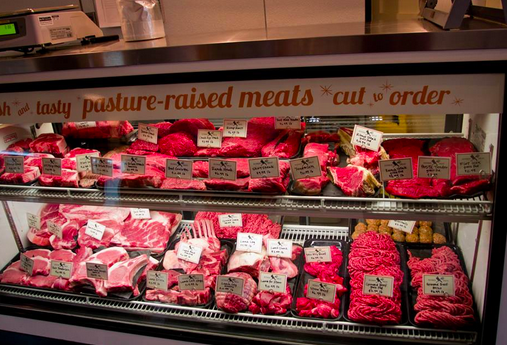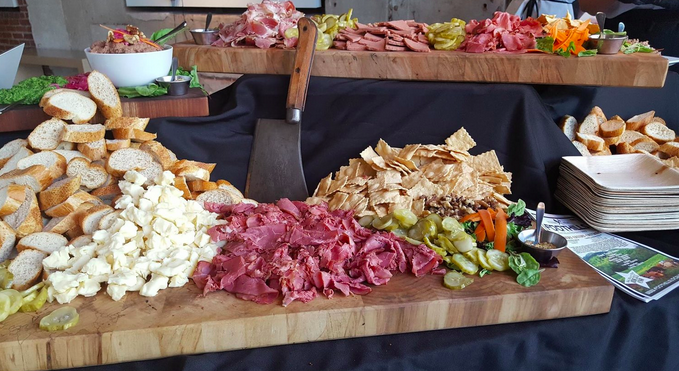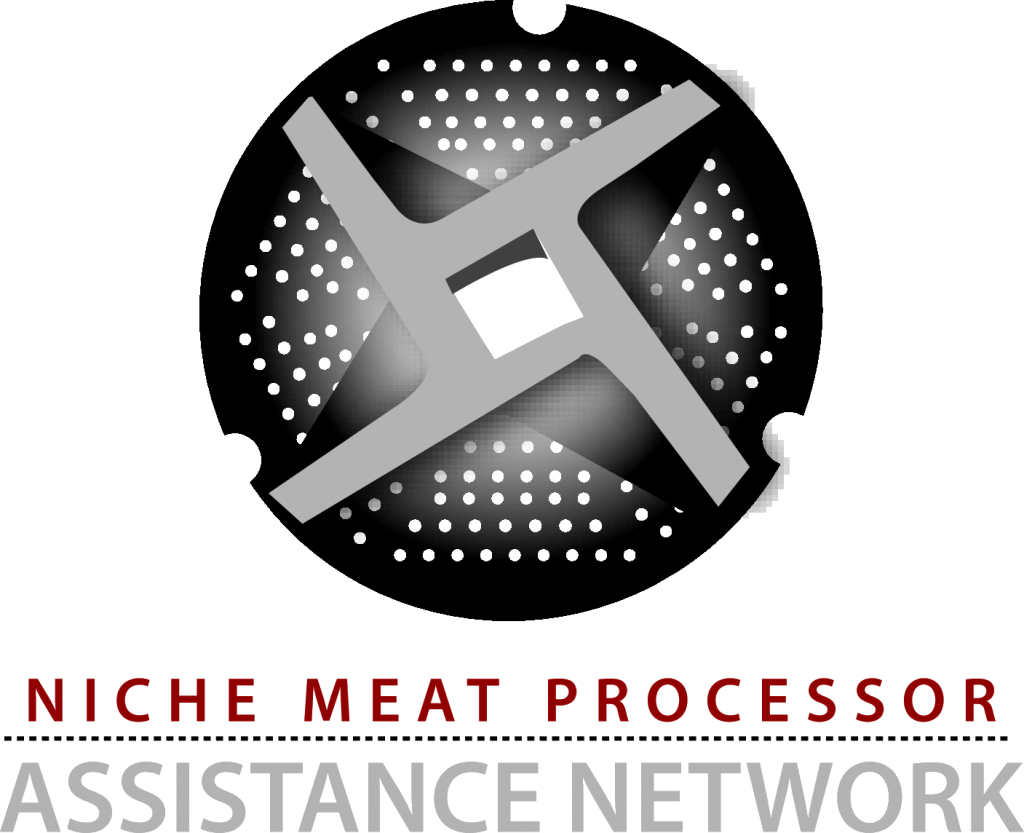This page will discuss retail butchering, which is cutting meat for *mostly* direct sales to consumers with perhaps a little wholesaling. These type of facilities generally do not co-pack for independent farmers.
 Types of Retail Butcher Shops:
Types of Retail Butcher Shops:
USDA Exempt– butcher shop buys in all USDA inspected carcasses (or primals/subs) but does retail cutting and processing without the benefit of USDA inspection. For mainly on-site sales with a very limited percentage of wholesale sales. Still subject to state Department of Health rules and FDA Food Code. Most “custom exempt” shops, restaurants, and grocery store meat counters fall into this category.
USDA Inspected– butcher shop buys in all USDA inspected carcasses (or primals/subs) and does retail cutting and processing with the benefit of USDA inspection. Shops in this category typically do quite a bit more wholesaling off-site than they do retail sales. Also subject to state Department of Health rules and FDA Food Code.
Hybrid– butcher shop buys in all USDA inspected carcasses (or primals/subs) and does non-inspected retail cutting and USDA inspected wholesale cutting. The Piggery in Ithaca, NY is a good example of this, along with Weeping Radish Brewery & Butchery in Grandy, NC. Also subject to state Department of Health rules and FDA Food Code.
State Inspected– butcher shop buys in all USDA or state inspected carcasses (or primals/subs) and does retail cutting and processing with the benefit of state inspection. For in state sales only. Only available in the states with state meat inspection programs (27 of them currently) or Talmadge-Aiken plants. Also subject to state Department of Health rules and FDA Food Code.
Examples:
The Piggery, NY. Hybrid- does both exempt and inspected butchering. Retail shop on site and wholesale markets. Also processes for farmers under inspection. This business started in their home basement for just $6,500 before expanding to a full-scale inspected processing facility.
Weeping Radish Brewery & Butchery, NC. Hybrid- does both exempt and inspected butchering. Retail shop, restaurants on site and some wholesale markets. Also processes for farmers under inspection.
Pono Farm & Fine Meats, OR. USDA Exempt butchery and restaurant. Business is currently for sale.
Sugar Mountain Farm, VT. Just transitioned from state to USDA inspected. Sales via CSA, online sales, some wholesaling.
Tails & Trotters, OR. USDA Exempt butchery with retail shop. Also wholesales USDA inspected product that is co-packed at a USDA inspected facility nearby.
Marble Creek Farmstead, AL. USDA inspected poultry processing and a USDA Exempt red meat butchery. Sales limited to mostly on-line sales within state.
Sample Start-up Costs (all include building costs unless otherwise noted):
| Size of Space | Start-up Costs | Operating Costs |
| 10,000 sq ft. | $4 Million | $2.1 Million (revenue is $2.4 M) |
| 7,000 sq ft. | $2.1 Million | $350,000 |
| 2,880 sq ft. | $500,000 | $140,000 (cutting just 2 days/week) |
| 1,500 sq ft. | $300,000 | $1 Million |
| 1,000 sq ft. | $350,000 (doesn’t include building) | $190,000 |
| 320 sq ft. (The Locker) | $115,000 | Unknown, probably $80-100K |
Other Business Advice:
-Start small, start with just your own product for limited local sales.
-Retrofit an existing building or commercial kitchen if possible. Building from scratch is expensive, ties up cash flow, and generally provides a lower return on investment.
-If you only need to process meat 1-2 days a week, see if you can sub-lease some commercial kitchen space or use a restaurant kitchen on their closed days. Share costs, reduce risks.
-Build brand awareness and market position before you expand.
-Don’t take on other farmers co-packing until you have all your systems dialed in and you have some foundational throughput with your own product.
-Build in a deli or other prepared meals into your storefront so that you can move product out of the fresh meat case into a product for sale. This limits shrink and prepared foods can have higher margins in some cases.
-Even though retail exempt processing does not require HACCP plans, it is a good idea to create them anyways to prevent risk and food safety problems down the road. Also, should you ever decide to transition to inspection, you will be part-way there with systems in place.
-Take food safety seriously. Get good at creating cured, fermented, smoked products before you ever sell them to the public. Experiment at home, not with paying customers.
-Keep good records, particularly if you are wholesaling so you can stay within the dollar limits. Of if you are doing both inspected and retail exempt processing, keep product separate and keep meticulous records.
USDA FSIS policy regarding whether the preparation of meat products for sale to other than household consumers by a retail store is exempt from inspection is based on what operation is employed in preparing the product, and where that operation falls under 9 CFR 303.1 (d) (2) (iii) (f). If the retail store engages in the operations of cutting up, slicing, and trimming of carcasses, halves, quarters, or wholesale cuts into retail cuts such as steaks, chops, and roasts, and freezing such cuts; grinding and freezing products made from meat; breaking bulk shipments of products; or wrapping or rewrapping such products in the preparation of retail products for sale to other household consumers, it would be exempt from inspection. 9 CFR 303.1 (d) (2) (iii) (f). The retail store would also have to make no more than 25% of its sales to other than household consumers (wholesaling)), and its sales to other than household consumers (wholesaling) could not exceed the dollar limits on such sales that FSIS establishes. 9 CFR 303.1 (d) (2) (iii) (b).
Retail exemption allows a meat processor to sell meat at its own retail storefront (or direct to consumer via other methods such as farmers market sales or a restaurant) without developing a HACCP plan or being inspected daily by USDA FSIS. However, the processor is still subject to periodic, risk-based inspection by USDA FSIS and/or state and county authorities (e.g. county health departments). In addition, the meat used to produce retail products (fresh cuts or processed meats) must come from livestock inspected by USDA FSIS or the state inspection agency in the processor’s own state. See the full CFR 303.1 regulations here.
Retail exempt operations are required to start with product that has been inspected – by either a state program or by FSIS.
-
If the retail exempt product is derived from state inspected product, the retail exempt product can only be sold within the state where the meat / poultry was inspected. So if, for example, the state of Iowa inspected meat / poultry was used for in the production of a retail exempt product, the retail exempt product could only be sold within the state of Iowa.
-
If the retail exempt product is derived from a USDA FSIS inspected product, the retail exempt product can be sold in other states. So if, for example, a retail exempt operation in Iowa uses USDA FSIS inspected product for its retail exempt production, the retail exempt product could be sold anywhere in the 50 states.
Retail exempt processing include operations of types traditionally and usually conducted at retail stores and restaurants, such as:
(a) Cutting up, slicing, and trimming carcasses, halves, quarters, or wholesale cuts into retail cuts such as steaks, chops, and roasts, and freezing such cuts;
(b) Grinding and freezing products made from meat;
(c) Curing, cooking, smoking, rendering or refining of livestock fat, or other preparation of products, except slaughtering or the retort processing of canned products;
(d) Breaking bulk shipments of products;
(e) Wrapping or rewrapping products.
Only (a), (b), (d), and (e) are allowed for wholesaled products (meaning that the processes listed under (c) above are NOT allowed for wholesaled product). Retail-exempt wholesaling is limited to only 25% of the dollar value of the processor’s total sales or $75,700 for red meat and meat products and $56,600 for poultry products per calendar year, whichever is LESS (Federal Register 8/15/18). The dollar value limit is reevaluated annually by FSIS.
The Federal Meat Inspection Act (FMIA) does not prohibit exempt retail store operators from using (and paying) third-party businesses, to:
-
advertise
-
market
-
store product in commerce at an independent warehouse or food hub prior to delivery to the consumer
-
deliver, and
-
collect the money for the sale of their retail exempt products to consumers, but the retailer must sell the exempt meat food product to the consumer in order to be exempt. The retailer cannot sell the product for resale.
There is no limit to the number of stores or outlets where a company can sell their retail exempt meat provided that the meat:
-
originates from a retail store where there are sales directly to consumers. There must be sales to consumers occurring at the location where the product is prepared. This doesn’t mean it must be an over-the-counter brick and mortar store there. The Agency recognizes that those sales to consumers could consist solely of internet orders, phone orders, or fax orders.
-
is distributed (not sold) to these alternative locations. “Sale for resale” / wholesaling requires inspection.
-
is sold from the alternative locations directly to consumers.
Support & Training:
NMPAN is not endorsing any specific organization below. These are just some places for additional support for retail butchers.
Range Meat Academy has some great course to train meat counter staff in topics such as meat cuts, meat science, and cooking meat.
The Butchers Guild is a fraternity of meat professionals bound to an oath to sell good meat. They provide networking and training opportunities, job postings, and more.
The Good Meat Project conceives and conducts hands-on, experiential education events and workshops, envisioned for consumers, farmers, butchers, and chefs.
Chefs Collaborative has a Meat Matters program that organizes industry workshops, field trips, butchery demonstrations and dining events to help educate and inspire fellow professionals and all eaters about sustainable meat options.
In addition, the American Association of Meat Processors (AAMP) and many state-level meat processor associations have a very strong emphasis on retail butcher shops.
Webinars & Case Studies:
Microbiology 101 for Small Meat Processors webinar
Date: February 1, 2012
Duration: 95 minutes
Meat processors increasingly need to understand microbiology concepts and terms, from N-60 sampling and multi drug resistance to Non-0157 STECs, CFU, APC, PCR, and PFGE. Two Pennsylvania State University food scientists with many years experience working with small meat processors explain the basic microbiological terms that processors – and their customers – need to understand. The webinar has four sections: Microorganisms in Food, Pathogens, Spoilage Organisms, and Microbial Analysis.
The Business of Dry Curing webinar
Date: June 25, 2014
Duration: 60 minutes
There has been significant consumer interest in dry cured charcuterie products, like salumi, in recent years. Consumers love it, chefs want it and it is a good way for producers and processors to get more value out of a carcass and/or really set their brand apart. Yet making dry cured products can be challenging and not always cost effective. On this webinar we’ll cover the Business of Dry Curing: we’ll hear about the growth of artisan cured meats, the basics of the business and talk to two charcuterie processors about how they got started, their day to day operations and the costs and revenue for dry curing.
Natural Curing for Meats webinar
Date: March 4, 2010
Duration: 1 hour
As interest rises in cured meats made without synthetic nitrates/nitrites, processors are seeking information on safe and effective methods. On this webinar, meat scientists, a processor, and an organic meats marketer explain ingredients, processes, and challenges to natural curing, as well as product labeling issues.
Midwestern Country Locker Case Study
This case study details an small, locker-type plant from the Midwest (the owners wish to remain anonymous). The facility has been in continuous operation since 1939, and the current owner is looking to build a new facility. Though the plant is state-inspected for hog slaughter and for processing, their work is 90+% custom uninspected, and they offer a wide variety of ready-to-eat products. The plant processes an average of 11 beef a week and 15 hogs, plus a large volume of deer in the fall and winter.
Foothills Local Meat/Butcher Bar Case Study
Foothills Meats is a retail exempt food-service company specializing in local and pasture-raised meats for retail and wholesale markets in the Asheville, North Carolina region. The core of their business is their food-service arm, which consists of permanent food truck, open daily at Hi-Wire Brewing’s Big Top, two new neighborhood Butcher Bar eateries, and their Catering Division, which offers a wide range of menu options for weddings and events of all sizes. Foothills also offers custom butchery, fabrication, sausages and primal cuts for wholesale buyers and home-use. Foothills meats can be purchased in bulk or bi-weekly through their Meat Share CSA program.



